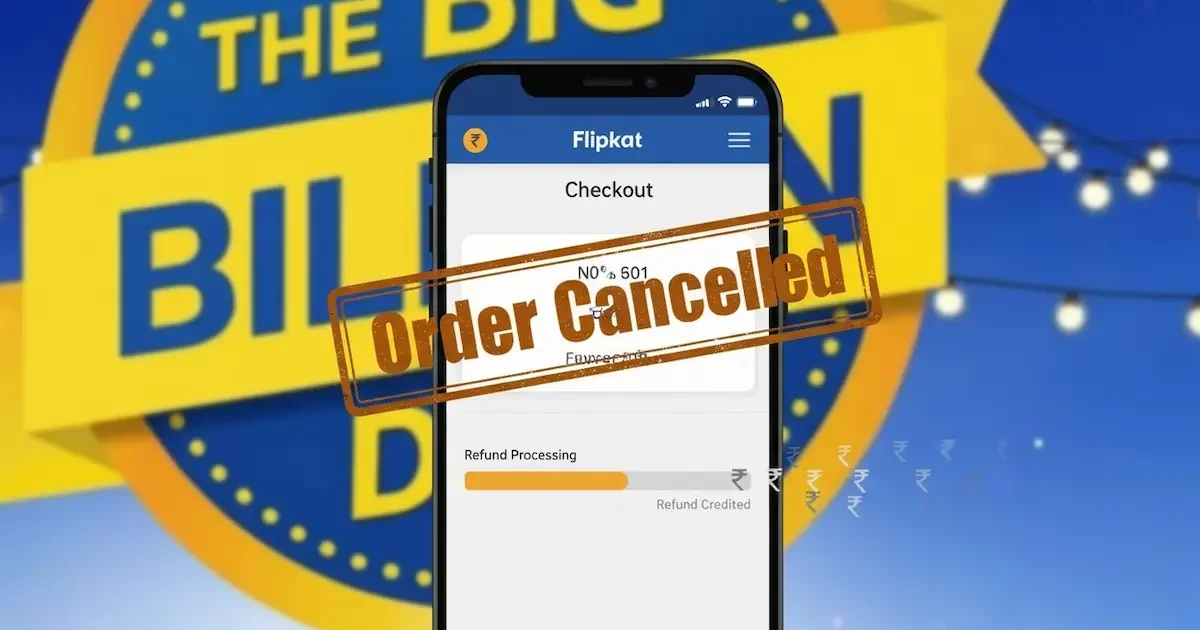Flipkart’s Big Billion Days Is Under Fire — What’s Going On With Those “Scam” Allegations?
If you’ve spent the last week doom-scrolling through X and Instagram, you’ve seen it: furious buyers claiming Flipkart cancelled their iPhone 16 orders after successful payment. The Big Billion Days (BBD) carnival — usually India’s favourite deal binge — has turned into a trust deficit. Let’s unpack what actually happened, why people are calling it a “scam,” and what you can do if your order was unceremoniously axed.
The flashpoint: iPhone 16 deals that vanished after checkout
This year’s BBD dangled irresistible Apple bait. Multiple outlets and screenshots show the iPhone 16 (128GB) effectively advertised around ₹51,999–₹52,999, and the iPhone 16 Pro (128GB) around ₹69,999 during early access (Flipkart Black/Plus) on September 22–23, 2025. Within hours, user timelines filled with the same story: payment successful, order placed, then cancelled — often with vague reasons like “payment failure,” “price mismatch,” or sudden “out of stock.”
Mainstream coverage echoed the complaints: orders cancelled or indefinitely delayed despite payment, with many refunds not showing up promptly. As of September 26–28, 2025, multiple reports note no detailed public explanation from Flipkart addressing the surge of cancellations.
Why users are crying “scam”
When you advertise a blockbuster price, take the money, and then cancel en masse, you trigger three things: anger, suspicion, and screenshots. Tech and business publications recorded widespread cancellations, with buyers posting proof that their transactions cleared but orders were nixed anyway. That pattern is what’s fuelling the “scam” narrative online.
The backdrop doesn’t help: India’s consumer regulators have been pushing platforms to clean up dark patterns — misleading UI copy, bait pricing, and hard-to-spot terms. Flipkart recently claimed it completed a self-audit on dark patterns for the Consumer Affairs Ministry, but fresh allegations have resurfaced post-BBD, including a governance group’s letter to the ministry flagging cancellations at advertised prices. In short: we were promised better, yet here we are again.
What could be happening behind the scenes (and why it still looks bad)
A few plausible operational causes don’t absolve the mess:
• Inventory mis-syncs: If stock counts lag while thousands hammer “Buy Now,” overselling is inevitable. Still, the platform must throttle orders or clarify “limited units.”
• Pricing rule errors: A misconfigured campaign or stackable bank offers can create unintended effective prices. That’s on the platform to QA before going live.
• Seller constraints: Marketplaces might blame “seller limits,” but buyers pay Flipkart, not an abstract seller ID — the responsibility for fulfilment and clear communication sits with the platform.
From a consumer lens, none of these justify taking money, cancelling later, and making people chase refunds. That’s the whole point of the backlash.
If your order was cancelled after payment: a practical playbook
1. Document everything
Save order IDs, payment confirmations (UPI/SMS/bank statement), emails/app notifications, and any chat logs with support.
2. Push for a timeline in writing
Use in-app support and email. Ask specifically: “When will the refund hit my account?” If you get a canned response, ask for escalation and a ticket number.
3. Raise a formal grievance
File on the National Consumer Helpline (NCH 1915 / app / consumerhelpline.gov.in) with all proofs. It creates a paper trail and often nudges a faster resolution.
4. Bank chargeback (if applicable)
For credit cards, raise a charge dispute citing non-fulfilment. For UPI/debit, lodge a complaint with your bank referencing the transaction ID.
5. Escalate publicly — carefully
Public posts with redacted proofs can attract faster attention from platform “escalations” teams. Stick to facts; avoid defamatory claims.
These steps are consistent with how similar BBD cancellation waves have been handled in prior years and with current reportage of refund delays and payment-marked cancellations this week.
How platforms can fix this (and regain trust)
• Real-time stock gating: Stop orders the instant stock dips below a tiny buffer.
• Price integrity checks: Kill switches when bank/coupon stacks break below approved floors.
• Clear disclaimers & transparency dashboards: Show “units left,” hard caps per user, and live wait-list status.
• Refund SLAs on the product page during mega sales (“Instant reversal for UPI, T+1 for cards”), with automatic compensation if breached.
• Independent audits with public summaries, not just declarations — because consumers don’t trust “we audited ourselves” anymore.
Should you still buy during BBD?
Yes — but play it like a pro, not a hopeful.
• Screenshot everything (price, offer breakdown, ETA).
• Prefer COD or card with strong dispute support for risky lightning deals.
• Don’t pre-pay for accessories/cases until the phone ships.
• Watch for “too good to be true” bundles and shifting bank-offer terms mid-checkout — a known pattern this season.
Bottom line
The Big Billion Days iPhone fiasco isn’t just a “bad batch.” It’s a trust problem created by advertised prices + accepted payments + cancellations — exactly the combo that triggers the “scam” label in the public mind. Until Flipkart issues a transparent post-mortem and enforces tight guardrails, expect Indian buyers to treat blockbuster deals with suspicion — and rightly so.
